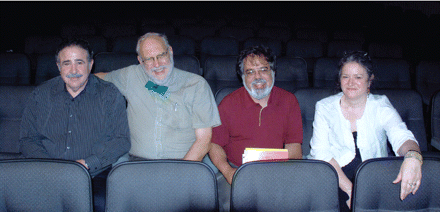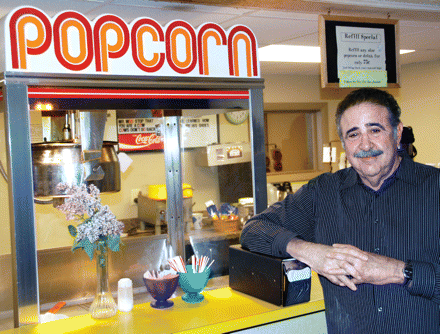Festival Focuses on Films With Mental Illness Themes
Abstract
Maybe it's not exactly first-date material, but an evening at the Reel Mind Film Series in Rochester, N.Y., begins with a cinematic tale of psychosis, depression, or obsessive-compulsive disorder and ends with a mind-opening discussion about mental illness and the people who live with it.

From left: Herb Katz, M.F.A., Laurence Guttmacher, M.D., Mark Ragins, M.D., and Ruth Cowing settle into their seats at the Cinema Theatre in Rochester, N.Y., at the screening of "The Soloist," part of the Reel Mind Film Series.
"Film can be an incredibly effective means of public education," said series cofounder Laurence Guttmacher, M.D., clinical director of the Rochester Psychiatric Center and a clinical professor of psychiatry and medical humanities and associate dean at the University of Rochester School of Medicine.
Guttmacher sought to use film as a way to reduce stigma and promote hope for mentally ill people after joining the board of NAMI-Rochester in 2007.

Herb Katz, M.F.A., a board member of NAMI-Rochester, lends 30 years of theatrical experience to movie selection at the Reel Mind Film Series.
There he found a kindred spirit in fellow board member Herb Katz, who holds an M.F.A. degree in theater and was artistic director of the Rochester Jewish Community Center for 30 years.
(Katz has combined that theatrical background and his experience with depression to write a one-man show, "Depression: The Musical." However, his illness has proved too overwhelming lately to allow him to perform it, he told Psychiatric News.)
In 2008, the two asked Ruth Cowing to help with the project. Cowing was then programming films for the High Falls International Film Festival and helped make connections with film distributors and filmmakers.
They next secured support from local mental health organizations and private donors. The local affiliate of Mental Health America now provides office support, answering the phone and selling tickets. Last year, the series also received grants from the New York State Council on the Arts and the Arts and Cultural Council of Greater Rochester.
The trio developed a model that included the screening plus a panel discussion moderated by a representative of a local mental health organization and usually featuring a local mental health consumer, a psychiatrist, and—when possible—someone associated with the film.
The films are fascinating and generate valuable discussions afterward, said Guttmacher in an interview. He estimates that one-third to one-half of the audience may be people who have had a psychiatric diagnosis at some time.
"We try to pick films that have some message of hope in them because we have a recovery focus," said Guttmacher. "We avoid films about `survivors' who have had bad experiences with the mental health system."
They have shown "One Flew Over the Cuckoo's Nest," however, with Guttmacher discussing the changes in psychiatry in the 35 years since the film's debut.
The first film in the series, "My Mother's Garden" by Cynthia Lester (which is about hoarding), was shown at the High Falls Festival to get some initial exposure.
"People were lined up around the block to get in," Cowing told Psychiatric News.
Since then, they've used the 280-seat Cinema Theatre for the screenings. The rest of that year, they screened "Out of the Shadows" (about schizophrenia), "Autism: The Musical," and "The Devil and Daniel Johnson" (about bipolar disorder).
In 2010, in addition to films, Katz arranged for presentation of a live, one-man play written and performed by Frank LaFrazia about growing up in Rochester with his mother, who had bipolar disorder.
Besides "Cuckoo's Nest," the series occasionally presents Hollywood films like "Ordinary People" and "The Soloist" (see Psychiatrist Goes Behind Scenes of Award-Winning Film).
However, audiences respond more to documentaries than to feature films, which seem one level removed from real experience, said Cowing.
For instance, at this year's screening of "OC87: The Obsessive Compulsive, Major Depression, BiPolar, Asperger's Movie," filmmaker Bud Clayman's autobiographical story, the combination of Clayman's presence with audience members' personal narratives was very powerful, she said.
"The audience sees the filmmaker telling a very intimate story of pain, vulnerability, and triumph, and by the end of the film feels both a connection to that person and an opening to share their stories," Cowing noted.
Similar reactions developed after the 2010 showing of "Unlisted: A Story of Schizophrenia" by Delaney Ruston, which chronicled the pain Ruston suffered as a child of a father with mental illness. Many family members in the discussion afterward began to open up and share their stories of loving someone yet needing distance or a break from them from time to time.
"People see the vulnerability and then the arc of recovery, and that gives them hope," Cowing pointed out.
"You can sense a community building around the film," added Guttmacher. "Folks who might otherwise be isolated seem to combine into a 200-person therapy session."
Cowing agreed.
"One of the greatest things about this series is that over the last three years, we have created a safe space to which people can come and open up about the diagnoses and fears that so many of them have felt forced to hide for so many years," she said. "And the more these discussions have taken place over the years, the more normalized hearing about someone's diagnosis has become."
There are other attractions.
"The popcorn is really good, too," Guttmacher noted.



